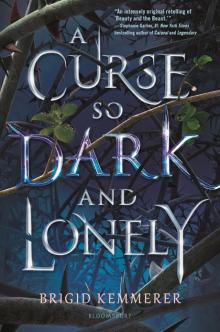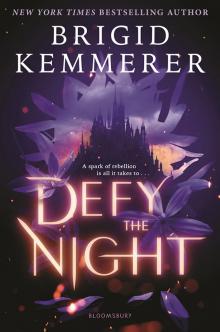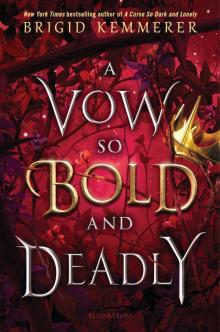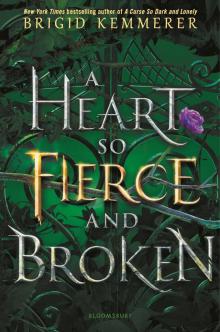- Home
- Brigid Kemmerer
Forging Silver into Stars Page 2
Forging Silver into Stars Read online
Page 2
And if I did, Nora would … go where exactly? She’s too young to be a soldier. She’d hate it anyway. She blanches at the sight of blood, and she’s afraid of the dark. She still climbs into bed with me half the time, after she’s had another nightmare about the Uprising.
“Cally-cal,” she’ll whisper sleepily, my childhood nickname soft on her lips as she winds her fingers in my long hair. She’s the only one who can make a name like Callyn sound whimsical.
She’d be put in an orphanage—if she were lucky.
She will be put in an orphanage if I can’t pay these taxes. Or we’ll be begging on the streets.
My eyes burn, and I blink the sensation away. I didn’t cry when Mother died in the war with Emberfall. I didn’t cry when Da died and we had to beg for passage back to Briarlock.
I won’t cry now.
Out in the barn, the hens start to cluck, and Muddy May, the old cow, moos. The door rattles against the wood siding. That faint hint of purple over the mountains begins to streak with pink. In a few hours, the glistening snow will be slush and mud again, and Nora and I will be bundled up, thrusting a hand under the hens to find eggs, bickering over who has to sit in the cold to milk May.
But those hens keep clucking, and a faint orange glow suddenly pokes from below the creaking barn door.
I sit up straight, my heart pounding. It’s been half a year, but the events at the Crystal Palace are still fresh in my memories. The clap of thunder, the flash of light.
But of course there’s no magic here. Could it be a fire?
Underneath my flare of panic, I have the thought that I should just let it all burn to the ground.
But no. The animals don’t deserve that. I grab for my boots, jerking them onto my feet without waiting to lace them. I sneak down the hallway past Nora’s room, stepping lightly so I don’t make the floor creak. If I didn’t want her to see the note from the tax collector, I definitely don’t need her to see the barn burning down.
I make it to the steps down into the bakery, but I trip over my loose laces and nearly go face-first into the brick floor at the bottom. I overturn the stool where I sit to take orders, and it clatters to the ground, rolling haphazardly into the shelves. A metal bowl rattles onto the bricks, followed by a porcelain dish I use for large loaves. That shatters, bits going everywhere.
Amazing.
I wait, frozen in place. My leg is at an awkward angle, but I hold my breath.
No sound comes from upstairs.
Good.
The cold hits me in the face when I slip out the door, but I hear the cow again, so I hurry through the frozen mud. I have a few weeks’ worth of hay and straw in the loft, but I’m always good about stacking them away from the walls. Some must have gone moldy anyway, and moldy hay is always likely to start a fire. That stupid door needs fixing.
Like a working door will matter if the barn is a pile of ashes.
Halfway across the frigid yard, I realize the tiny glow hasn’t spread.
And I don’t smell smoke.
Muddy May moos again, and I hear the low murmur of a man’s voice.
I freeze for an entirely new reason. My heart rate triples, the world snapping into focus.
Not a fire. A thief.
I grit my teeth and change course, striding across the yard to the small shed where we keep tools. Mother’s old weapons are wrapped up under my bed, but I don’t have much practice with a sword. The ax hangs ready, slipping into my hand like an old friend. I can split firewood without breaking a sweat, so I have no doubt I can make a thief regret his choices. I swing the ax in a figure eight, warming up my shoulder. When I get to the broken door, I grab hold and yank.
The door creaks and moans as it moves faster than the hinges are ready for. The shadow of a man shifts behind the cow. A blazing lantern sits not far off—the source of the orange glow.
I swing the ax around, letting the flat side slam into a wooden post. The hens go wild with clucking, and May spooks, jerking the rope where she’s tied and overturning the bucket.
“Get out of my barn,” I yell.
May spooks again, her hooves scrambling in the dirt as she shifts away from me, and she must slam into the man, because he grunts and then falls, tangling in the length of his cloak. Wood clatters to the ground beside him, and I hear a crack as it gives way.
“Clouds above, Cal!” he snaps, jerking the hood of his cloak back. “It’s just me!”
Too late, I recognize the light hazel eyes glaring at me from under a spill of dark hair. “Oh.” I lower the ax and frown. “It is you.”
Jax swears under his breath and reaches for his crutches, dragging them through the straw. His breath clouds in the frosty air. “A good morning to you, too.”
I’d offer to help him, but he doesn’t like help unless he asks for it. He rarely needs it anyway. He rolls to his foot smoothly, if not agilely. He gets one crutch under his left arm, but the other snapped at the end, and it’s too short now.
He looks at the jagged end, sighs, and tosses it to the side, then switches the good crutch to his right side to compensate for his missing right foot. “I thought you’d be asleep. I didn’t realize I’d be taking my life into my hands by coming here.”
I’m trying to figure out if I’m at fault here or if he is. “Do you want me to run back to the forge for some tools?” I offer. He used to make his crutches out of steel, but his father always said it was a waste of good iron. Now he’s well practiced in making them out of wood.
“No.” He tugs his cloak straight, then balances on one foot while he uses the good crutch to right the milking stool. “You can grab the bucket, though.” He drops onto the stool, then blows on his fingertips to warm them. He puts a hand against the cow’s flank. His voice gentles in a way that only happens when he talks to animals, never people. “Easy there, May.”
The cow flippantly seizes a mouthful of hay and whips her tail, but she sighs.
I seize the frigid bucket and hand it to him. “You … you came over in the middle of the night to milk the cow?”
“It’s not the middle of the night. It’s almost dawn.” He grabs hold of a teat with practiced ease, and a spray of milk rattles into the tin bucket. “I didn’t want to wake you by firing up the forge.” He hesitates, and the air is heavy with the weight of unspoken words.
Ultimately, he says nothing, and the breath eases out of him in a long stream of clouded air.
He studies the bucket. I study him.
Most of his hair is tied into a knot at the back of his head, but enough has spilled loose to frame his face, throwing his eyes in shadow. He’s lean and a bit wiry, but years of forge work and using his arms to bear his weight have granted him a lot of strength. We’ve known each other forever, from the time when we were children, when everything in our lives seemed certain and sure, until now, when nothing does. He remembers my mother, and he sat with me and Nora when she didn’t return from the war. He sat with me again when Da died.
He doesn’t know his own mother, but that’s because she died when he was born. When his father is drunk, I’ve heard him say that was the first mark of misfortune Jax brought on the family.
The second mark came five years ago, when Jax was thirteen. He was trying to help his father fix a wagon axle. It collapsed on his leg and crushed his foot.
I guess the third mark almost came courtesy of my ax. “I’m sorry I almost cut your head off,” I say.
“I wouldn’t have complained.”
Jax is one for brooding, but he’s not usually so sullen. “What does that mean?”
He lets go of a teat to thrust a hand under his cloak, then tosses a piece of parchment in my direction. I drop the ax in the straw to fetch it.
When I unfold the paper, I see the exact same writing that was on the parchment from the tax collector, the note that’s still sitting in my bedroom.
The number on his is twice as large.
“Jax,” I whisper.
“The tax coll
ector came to the forge,” he says. “She claimed we haven’t paid in two years.”
“But—but the forge has so many customers. I’ve seen them. You—you make a decent living …” I see his expression, and my voice trails off.
“Apparently when my father leaves to pay the taxes every quarter, he’s not actually paying them.” Jax is dodging my gaze now.
I wonder if that means his father gambled the money away—or if he drank it away.
Not like it matters. Both options are terrible.
May’s milk keeps spraying into the bucket rhythmically. I grab the other milking stool from the corner and plop it down beside him. Jax doesn’t look at me, but he ducks his face to toss the hair out of his eyes.
I watch his hands move with practiced efficiency. His fingers are red from the cold, scarred here and there from forge burns.
I wish I knew how to help him. I barely know how to help myself.
My midnight worries feel so selfish suddenly, when I have options. They’re not options I want, but they’re options I have. I can sell the farm. I can enlist. I’d probably never make it past the rank of cadet, not with Father’s stain on our family, but I could do it. Nora can go to an orphanage—or I could possibly use part of a soldier’s pension to pay for her to have a guardian somewhere.
Jax can’t do any of those things. His father barely stays sober long enough to work now. Jax is the one keeping the forge in business. He can’t be a soldier. With a missing foot, few people would take a chance on Jax as a laborer—or anything else.
If they lose the forge, they’d lose everything.
I put a hand on his wrist, and he goes still. “You don’t have to milk the cow,” I say quietly.
He turns to look at me. There’s a shadow on his jaw, and I wonder if he got the bruise when May knocked him down—or if his father did it. They live all the way down the lane, but when they fight, I can often hear it from here.
He must notice me looking, because he turns away—which says enough.
I let go of his wrist.
He keeps milking.
“We owe a hundred,” I whisper so softly that I don’t think he’ll hear it.
But he does, of course he does, because he turns to look at me again. Our breath clouds in the air between us. He always smells faintly of smoke from the forge, and the scent is sharp in the cold air.
When we were younger, after he lost his foot, I would bring him sugared twists of dough from the bakery every day, along with books from my mother’s library. We loved tales of romance or history, but our favorite books were the stories of wind and sky and magic from the winged creatures in the ice forests to the west of Syhl Shallow.
I remember the day my mother stopped me. I’d been twirling around the kitchen, eager to go visit my friend.
He won’t make a good husband, she said, and the feel of her disapproval was so thick in the air that I felt like she’d slapped me.
She didn’t let me go. I didn’t see him for weeks, until he found some crutches and hobbled his way down the lane to our bakery.
I never told him what she said.
It didn’t matter, because he’s never said or done anything to indicate he even saw me that way.
But there are moments like this, when it’s cold and dark and the entire world feels like it’s caving in, and I wonder, just for a heartbeat, what it would be like if Jax and I were more than friends. If we were in this together.
“Callyn?” Nora’s worried voice calls from out in the courtyard, high and frightened. “Callyn?”
I jerk back and inhale sharply. “In the barn!” I call. “I’m here!” I look at Jax. “She doesn’t know,” I whisper fiercely.
He nods.
The door rattles and creaks as she tries to push it to the side. She’s in a sleeping shift, her feet bare. Her hair is a wild mess of tangles that reaches to her waist, and she’s shivering wildly. Tears seem almost frozen on her cheeks.
“Nora!” I exclaim. I pull my own cloak free. “You’ll freeze to death. You need to get back in the house!”
“I—I was worried—”
“I know. Come on.”
At the barn door, I pause and look back at Jax. To my surprise, he’s watching me go.
I wish I knew what to say.
He must not either, because he gives me a nod, blows on his fingers one more time, and turns back to the bucket.
CHAPTER 2
JAX
My ears ring with the sound of iron against steel, but I don’t mind. I was raised alongside the forge, so I can sleep through it if I have to.
Right now, the rhythmic clanging is all that’s keeping me grounded. I haven’t seen my father since midnight. When he disappears like this, frustration usually sets up camp in my gut, because without his help, I’ll never catch up on the work we have due.
Today, I’m happy to leave him facedown in a puddle of spirits. Maybe he’ll drown.
The forge is always busy this time of year. Farmers need new pitchforks and spades to prepare for the early planting season, and I can never make them fast enough. A man from the next town over requested new blades for his thresher, and I told him it’ll take a week, but I should’ve told him two. Once the snows began to taper off, carpenters started buying so many nails that I’ve taken to forging them at night, just so I have a supply at daybreak. With the slush and mud, travelers are forever needing repairs to wagon wheels and axles. There’s a blacksmith on the other side of Briarlock, too, but she’s in her seventies, so she sends us anything big—and I try to return the favor by sending expensive detailed metalwork her way. She gets the fancy buckles and etched daggers, I get the sickles and horseshoes.
I think of that note from the tax collector and wonder if I should be taking any commissions I can get.
I swear under my breath and slam the hammer against the red-hot steel on my anvil. Two hundred silvers. All pissed away on ale or dice.
Wherever Da is, he’s lucky. If he were here right now, I’d knock him into the forge.
The thought feels hollow. I can’t knock him anywhere. That’s why I’ve got a bruise on my jaw and an ache in my belly from where he kicked me. I might be a lot of things, but fast doesn’t make the list. It’s too easy to get me off my feet.
Off my foot.
The worst part is that I had put aside a little bit of silver for Callyn. She’s too proud to ask for it, but I know how much she’s struggled since she discovered her father was giving away their silver to help fund the attack on the king. I knew the tax collectors would be around eventually. It’s only ten silvers that I stashed beneath my mattress, but it would have helped her a little. Cal would’ve taken it if it meant keeping Nora safe.
Now the tiny pouch of coins is going to have to help me save the forge—and it’s nowhere near enough.
She always brings me bread and sweetcakes when the bakery has them left over—which is often. Surely I can spare five.
I don’t know why I think that’ll make a difference for either of us. We’re both going to be on the streets in a matter of weeks.
My chest tightens, and then my throat. I’m used to my eyes burning from the heat of the forge, but this is different. I slam the hammer and shake off the emotion.
When I was a boy, Da used to talk about how I’d be able to turn around our misfortune when I became a soldier in the Queen’s Army. He was teaching me to hammer shields and swords as soon as I was old enough to pull steel from the fire. “An armory always needs a talented metalsmith,” he’d say, beaming with pride at my evolving skill. “Mounted soldiers always need a farrier.”
Then a wagon fell on my leg, crushing my ankle and foot. My entire future, burned out of existence. The village physician said I was lucky to survive.
Ah, yes. I feel so very lucky.
“Boy!” A woman clears her throat from behind me, her tone impatient. “I’m looking for Ellis the blacksmith.”
My father. I grit my teeth and hope this isn’t someone e
lse we owe money to. “He’s not here.”
“And when will he return?”
The spade I’m fashioning has cooled, so I pull it off the anvil and thrust it back into the forge, then drag a sleeve across my forehead and turn. The middle-aged woman standing under the archway is unfamiliar, most notably because she’s wearing belted silk robes in red and purple, and the hem is wet from the slush—meaning she’s not from Briarlock. Anyone here would have the sense to wear trousers and boots, or to tie up their skirts.
But judging by the jeweled rings on her fingers and the wide chain of gold hanging from her neck, she’s also clearly wealthy. I bite back the sour tone in my voice. “I don’t know. But I can make you anything you need from the forge.” I pause. “My lady.”
She gives me a disdainful up-and-down glance, and I realize she has two different-colored eyes: one blue and one brown. I see the moment her gaze stops at the bottom of my leg. I have a small padded stool that I use to keep my balance when I need to stand, and it serves my purposes well—until people stare at it.
We need silver, so I can’t let my temper get the best of me. I tightly add, “Does your carriage need mending? Or did your horse slip a—”
“I don’t need any metalwork. I’m looking for Ellis. The blacksmith.”
“Oh.” I jerk the glowing steel back out of the fire with my tongs and hold it against the anvil. “Then you’re welcome to wait.” I swing my hammer hard, and I have the privilege of seeing her flinch.
“Boy. Boy!” She’s shouting now.
I don’t stop swinging. “What?” I yell over the clanging.
“I need to know when he will return!”
Hopefully never. “You can ask at the tavern.” I glance past her without missing a swing. The morning sun shines through the trees, but I feel as though I’ve been awake for a week.
“I asked at the tavern,” she says. “He hasn’t been seen.”
If anything would make my hammer go still, that does it. I turn and look at her. “Then I truly have no idea where he could be. You could try the gaming tables. Or the brothel.”

 More Than We Can Tell
More Than We Can Tell Sacrifice
Sacrifice Fearless
Fearless A Curse So Dark and Lonely
A Curse So Dark and Lonely Elemental
Elemental Thicker Than Water
Thicker Than Water Storm
Storm Spirit
Spirit Spark
Spark Defy the Night
Defy the Night Call It What You Want
Call It What You Want A Vow So Bold and Deadly
A Vow So Bold and Deadly A Heart So Fierce and Broken
A Heart So Fierce and Broken Breathless
Breathless Breathless (Elemental)
Breathless (Elemental) Secret (Elemental)
Secret (Elemental)